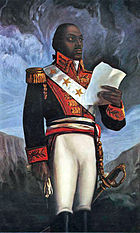Haitian revolution
| Haitian Revolution |
| Part of the Atlantic Revolutions, French Revolutionary Wars, and Napoleonic Wars. |

Battle at San Domingo, a painting by January Suchodolski, depicting a struggle between Polish troops in French service and the slave rebels and freed revolutionary soldiers |
| Date |
21 August 1791 – 1 January 1804
(12 years, 4 months, 1 week and 4 days) |
| Location |
Saint-Domingue |
| Result |
Haitian victory
|
Territorial
changes |
Independent Empire of Haiti established |
|
| Belligerents |
1791–1793
 Ex-slaves Ex-slaves
 French royalists French royalists
 Spain (from 1793) Spain (from 1793)
1793–1798
 French royalists French royalists
 Great Britain Great Britain
 Spain (until 1796) Spain (until 1796)
1798–1801
 Louverture Loyalists Louverture Loyalists
1802–1804
 Ex-slaves Ex-slaves
 United Kingdom United Kingdom
|
1791–1793
 Slave owners Slave owners
 Kingdom of France (until 1792) Kingdom of France (until 1792)
 French Republic French Republic
1793–1798
 French Republic French Republic
1798–1801
 Rigaud Loyalists Rigaud Loyalists
 Spain Spain
1802–1804
 French Republic French Republic
 Spain Spain
|
| Commanders and leaders |
1791–1793
 Dutty Boukman † Dutty Boukman †
 Georges Biassou Georges Biassou
 Vincent Ogé Vincent Ogé 
 André Rigaud André Rigaud
1793–1798
 Paul-Louis Dubuc Paul-Louis Dubuc
 Thomas Maitland Thomas Maitland
 Joaquín Moreno Joaquín Moreno
1798–1801
 Toussaint Louverture Toussaint Louverture
1802–1804
 Toussaint Louverture Toussaint Louverture 
 Jean-Jacques Dessalines Jean-Jacques Dessalines
 Henri Christophe Henri Christophe
 Alexandre Pétion Alexandre Pétion
 François Capois François Capois
 John Duckworth John Duckworth
 John Loring John Loring
|
1791–1793
 Viscount de Blanchelande Viscount de Blanchelande
 Léger-Félicité Sonthonax Léger-Félicité Sonthonax
1793–1798
 Toussaint Louverture Toussaint Louverture
 André Rigaud André Rigaud
 Alexandre Pétion Alexandre Pétion
1798–1801
 André Rigaud André Rigaud
1802–1804
 Napoleon Bonaparte Napoleon Bonaparte
 Charles Leclerc † Charles Leclerc †
 Vicomte de Rochambeau Vicomte de Rochambeau 
 Villaret de Joyeuse Villaret de Joyeuse
 Federico Gravina Federico Gravina
|
| Strength |
Regular army: 55,000,
Volunteers: 100,000+
31,000 |
Regular army: 60,000,
86 warships and frigates |
| Casualties and losses |
Haitians: 200,000 dead
British: 45,000 dead |
France: 75,000 dead |
| White colonists: 25,000 |
North American slave revolts
|
 |
-
1526 San Miguel de Gualdape
(Spanish Florida, Victorious)
-
c. 1570 Gaspar Yanga's Revolt
(Veracruz, New Spain, Victorious)
-
1712 New York Slave Revolt
(British Province of New York, Suppressed)
-
1730 First Maroon War
(British Jamaica, Victorious)
-
1733 St. John Slave Revolt
(Danish Saint John, Suppressed)
-
1739 Stono Rebellion
(British Province of South Carolina, Suppressed)
-
1741 New York Conspiracy
(Province of New York, Suppressed)
-
1760 Tacky's War
(British Jamaica, Suppressed)
-
1791 Mina Conspiracy
(Louisiana (New Spain), Suppressed)
-
1795 Pointe Coupée Conspiracy
(Louisiana (New Spain), Suppressed)
-
1791–1804 Haitian Revolution
(French Saint-Domingue, Victorious)
-
1800 Gabriel Prosser
(Virginia, Suppressed)
-
1803 Igbo Landing
(St. Simons Island, Georgia, Suppressed)
-
1805 Chatham Manor
(Virginia, Suppressed)
-
1811 German Coast Uprising
(Territory of Orleans, Suppressed)
-
1815 George Boxley
(Virginia, Suppressed)
-
1816 Bussa's Rebellion
(British Barbados, Suppressed)
-
1822 Denmark Vesey
(South Carolina, Suppressed)
-
1831 Nat Turner's rebellion
(Virginia, Suppressed)
-
1831–1832 Baptist War
(British Jamaica, Suppressed)
-
1839 Amistad, ship rebellion
(Off the Cuban coast, Victorious)
-
1841 Creole case, ship rebellion
(Off the Southern U.S. coast, Victorious)
-
1842 Slave Revolt in the Cherokee Nation
(Indian Territory, Suppressed)
-
1859 John Brown's Raid
(Virginia, Suppressed)
|
Haitian victory
1791–1793
 Slave owners
Slave owners
 Kingdom of France (until 1792)
Kingdom of France (until 1792)
 French Republic
French Republic
1793–1798
 French Republic
French Republic
The Haitian Revolution (French: Révolution haïtienne [ʁevɔlysjɔ̃ ajisjɛ̃n]), was a successful anti-slavery and anti-colonial insurrection that took place in the former French colony of Saint-Domingue that lasted from 1791 until 1804. It affected the institution of slavery throughout the Americas. Self-liberated slaves destroyed slavery at home, fought to preserve their freedom, and with the collaboration of mulattoes, founded the sovereign state of Haiti. It led to the greatest slave uprising since Spartacus's unsuccessful revolt against the Roman Republic nearly 1,900 years prior.
...
Wikipedia


![]() Slave owners
Slave owners![]() Kingdom of France (until 1792)
Kingdom of France (until 1792)![]() French Republic
French Republic![]() French Republic
French Republic